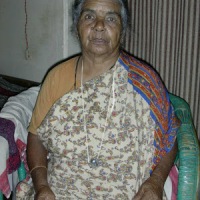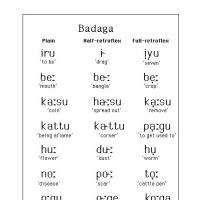Let us seek the blessings of Elders, ‘Doddavakka Harichili’
One of the wonderful and deeply meaning ful customs of Badagas, is the seeking of the blessings of elders. That is, whenever any person meets/visits an elder, he or she seeks the blessings of the elderly person [elderly does not mean aged/old but only elder by age] by bowing the head and requesting “Harachu (bless me)”. If any headgear like cap/turban is worn, the same is removed. Also, on social occasions, like when the’earmarked’/ selected devotees proceed towards the Hethay mane or at certain festivals the village elders bless the others who prostrate in front of them. Similarly, when the newly weds seek the blessings – ‘adda bubbadhu’, these blessings are given, though at times it is a shorter version that is used.
ondhu, ompaththu aagali,
[ondhu – one, ombaththu – nine, aagali – happen]
ondhu, saavira aagali,
[saavira – thousand]
harachchava kodali, sogava kodali,
[haracha – health, soga – happiness, kodali – given]
baNda hechchali, badhukku hechchali,
[banda – cattle, badhakku – wealth/prosperity, hechchali – increase]
bE hechchali, haalu hechchali, haNNu hechchali,
[bay/be – crops, haalu – milk, hannu – fruits)
manE katti, maaru kattili,
[mane – house, katti – build, maaru – marriage]
ondhu manE, saavira manE aagali,
[ondhu – one, mane – house, saavira – thousand]
beNNE bettu aagali, thuppa theppa aagali,
[benne – butter, betta – mountain, thuppa – ghei, theppa – well]
hulla muttilE hoo aagali, kalla muttilE kaai aagali,
[hullu – grass, hoo – flower, kallu – stone, kaai – (unripened) fruit]
honna muttilE sinna aagali,
[honnu – iron, sinna – gold]
bettadhudhu bandhalEyu, beraluga adangali,
[bettadhadhu – (like a big) mountain/lots, beralu – small finger]
attudhadhu bandhalEyu, aangai adangali,
[attudhadhu – (lile a deep) valley, aangai – palm/fist]
Kattidhadhu karEyali, biththidhadhu bEyali,
[Kattidhadhu – tied (cow), karyali – yield (milk)
aanaiya balava kodali, ariyaa siriyaa kodali,
[aanai – elephant, bala – strengh, kodali – given, ariya – a lot, siri – happiness]
budhdhi bevarava kodali,
[budhdhi – intelligence, bevara – wisdom]
uri hOgi, siri barali, siri sippaaththi agali,
[uri -envy, hogi -(be) gone, siri – happiness, sippaththi – plenty]
HOppa edE, bappa edE ellaa, oLLiththE barali,
[Hoppa -going/ travel, ede – place, bappa – coming, ella – all, olliththe – only good things]
nooru thumbi, naadu jaradhu, dheera pooraNa aagi,
[nooru – hundred, thumbi – filled, naadu – nation, jaradu – envious, dheera – wise, poorna – full]
OLLiththa Eththi, Hollava ThaLLi, olagodho ellaava Gedhdhu,
[olliththa – good deeds, eththi – taken, holla – bad, thalli – reject, olaga – world, ellava – complete, gedhdhu – win]
sangatta salippu illaadhe,
[Sngatta – illness, salippu – problems/hinderance]
hoppa dhaari, Bappa Dhaari yo, edinjilu iLLaadhe,
[dhaari – path, edinjilu – blockades]
padippEri mundhuga hesareththi,
[paddippu – education, mundhuga – forward, hesaretthi – name and fame]
kumbE kudi haradha engE, angaalu muLLu muriyaadhE,
[Kumba kudi – pumpkin, haradhu – spread, aangaalu – foot/sole, mullu – thorn]
kO endhu korachchi, bO endhu bokki,
[korachi – calling, bokki – overflow]
ManE thumba makka hutti, gOttu thumba sosE kondu,
[ mane – house, makka – children, hutti – born, gottu – corner, sose – daughters in law]
paava pariya nOdi, olagadha hesaru eththi
[paava – dear, paria – near ones, nodi – look after, olagadha -whole world, hesaru – name and fame, eththi – get]
badhukki baa[Badhukki – prosperity].










 Mookuthi
Mookuthi  Chinna
Chinna 






 ==
==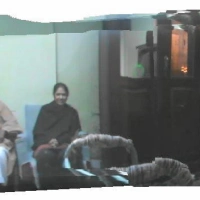
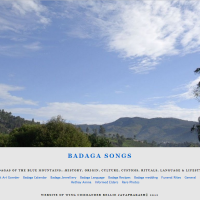
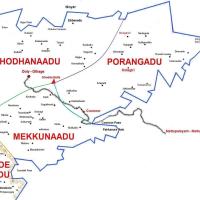
![Seemae [See'may] & Morae [Mo'ray] (relationship)](https://i0.wp.com/badaga.wordpress.com/files/2008/11/nakku-betta1.jpg?resize=200%2C200)
